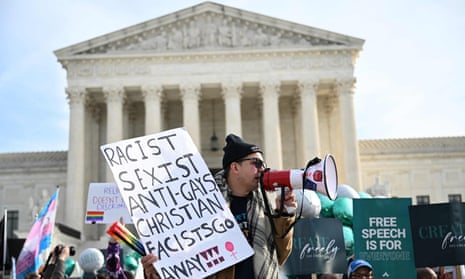On Friday the US supreme court expanded the right to free speech into a right of businesses to discriminate. In a 6-3 decision, with the majority opinion by Neil Gorsuch, the justices declared that a Colorado civil rights statute prohibiting discrimination on the basis of sexual orientation in public businesses violates the first amendment’s freedom of speech. The ruling appears to formalize the right of homophobic business owners to not serve gay people in some situations.
303 Creative v Elenis concerns a woman, Lorie Smith, who operates a website design service and wishes to be exempted from a Colorado civil rights law that requires her to treat all customers equally. Specifically, Smith, a conservative Christian, wants to be able to refuse service to same-sex couples seeking wedding websites, and to be able to place a banner on the home page of her business declaring that she will not make such sites. The court has in recent years dramatically expanded the free exercise of religion clause, often granting conservative Christian plaintiffs leeway to curtail their personal obligations to the law. But 303 Creative offers a different theory of the case: that the legal requirement not to discriminate against gay people is a violation of the plaintiff’s free speech.
It’s an odd, and expansive, vision of “speech”. There’s nothing stopping the web designer from, say, buying a billboard to advertise her opposition to gay rights, or from speaking out against such rights in her own writing, electioneering, internet posts and personal life. But Smith didn’t just want to be able to avail herself of all the vast opportunities for speech, expression, debate and persuasion available to her. She wanted to express her bigotry in her business, via the conduct of her public-facing commercial enterprise. She wanted to be able to discriminate at work.
The supreme court has now allowed her to. The justices’ decision pertains to the allegedly narrow question of “whether applying a public-accommodation law to compel an artist to speak or stay silent violates the free speech clause of the first amendment”. But there is no real limiting principle in the 303 decision, no matter what the court says; no guarantee that the precedent this decision sets will confine itself to legalizing only discrimination against gay people, or only refusal of service for weddings.
Indeed, the case threatens to unravel a whole matrix of anti-discrimination laws governing public accommodations, redefining public-facing commercial enterprises as speech and discrimination as personal expression. The label that Smith wants to put at the top of her business website – effectively declaring that only straight people can be served – evokes the darkest history of public discrimination in this country. The decision’s coming impact on America’s public sphere – where, now, businesses will claim an entitlement to discriminate against vast swaths of the public whom they don’t like – will unfold over the course of years, and it will be profound.
If 303 Creative sounds familiar, that’s because it’s an almost beat-by-beat rerun of a similar challenge to the same Colorado law, the Masterpiece Cakeshop case, where the court did not rule on the merits. In Masterpiece, a baker was asked to make a cake for two gay men’s wedding, and sued for the right to refuse them service.
Masterpiece garnered a lot of media attention, and much of it focused on the gay couple themselves – two men, in love and looking to celebrate a joyous milestone in their lives, who were subjected to bigotry and indignity, because of a baker who declared he had a right to make hatred a plank of his business. The men looked innocent, victimized, sympathetic. The court looked mendacious, opportunistic and cruel. They blinked.
The supreme court likes to pretend that it is not influenced by politics, but the court is in fact a profoundly political institution, tasked with calculating, just as any congressman does, how best to pursue unpopular Republican policy agendas with the least amount of popular pushback. The sympathetic gay couple in the Masterpiece Cakeshop case threatened to provoke pushback. That, as much as any putative legal concern, is why the court then punted.
They did not punt in 303 Creative, in part because there is no couple. In fact Smith, the web designer, was never asked to make a website for a gay wedding. At the time she filed her lawsuit, she didn’t even have an actual web design business. (She has one now, and the quality of the work does not make me suspect that gay couples are lining up to have her make websites on their behalf.) It’s not clear that the designer even has standing to sue – she never experienced the event that she says would so injure her.
But this means the case has a political virtue for the conservative justices: because there is no real injury in Smith’s case, there is also no gay couple who she has harmed, no one to give face to the impact of her now legally sanctioned bigotry. The decision will create such victims, but the court itself does not have to answer for them in its opinion.
303 Creative, then, is not so much a lawsuit over an actual conflict as it is a fiction of the conservative legal movement. The anti-gay legal machine arguing the case, Alliance Defending Freedom, found a plaintiff and concocted a complaint out of thin air specifically to avoid the pitfalls they encountered in Masterpiece. Interestingly, the New Republic reported earlier this week that a gay man who allegedly contacted Smith asking for her services may not even exist – or rather, that there is a man by the same name, but that he is straight, has been married to a woman for many years, and was wholly unaware that his name was being used in the case.
Oral arguments in December were conducted with roughly the same degree of bad faith, with Samuel Alito hijacking the proceedings at one point to pose hypotheticals involving children in Klan robes, a pointed and suggestive remark about dating websites addressed to Elena Kagan, and a convoluted scenario about a Black man playing Santa Claus at a mall.
That was about the level of argument advanced by the conservative lawyers, too, who attacked civil rights law via a profoundly cynical rationale: that to eliminate the obligation to serve all comers equally, and to legally sanction bigotry as an operating feature of a public business, would be to advance the cause of pluralism.
The argument in 303 Creative has the reasoning of an internet troll: that protecting the right to discriminate against gays in fact preserves diversity; that is, the kind of diversity that’s present when homophobes can discriminate and deny service in their businesses without sanction from the state. The diversity that is encouraged when all people, regardless of identity, can participate as equals in the public square is evidently not as meaningful.
Conservative opposition to civil rights law has long argued that not discriminating hurts the dignity of bigots. But the majority opinion seems uninterested in the dignity of gay couples, who now must be subjected to rejection and patronizing lectures about religious freedom when they are only seeking to buy flowers or wedding invitations. Their dignity, their ability to move through the public square with safety and respect, does not matter as much to the court.
And this is the baseline assumption of so much of this court’s jurisprudence: that there are some people whose dignity and freedom matters, and must be cognizable to the law – and some whose dignity and freedom do not matter, and can be ignored.
Moira Donegan is a Guardian US columnist

